PHOTOS: Cafe Terraces Reopen in Split After Three Months
March 1, 2021 - Cafe terraces reopen in Split after three (very long) months! A look at the cafe scene in sunny Split today.
March is off to a fabulous start as cafe terraces around Croatia reopen for the first time in three months.
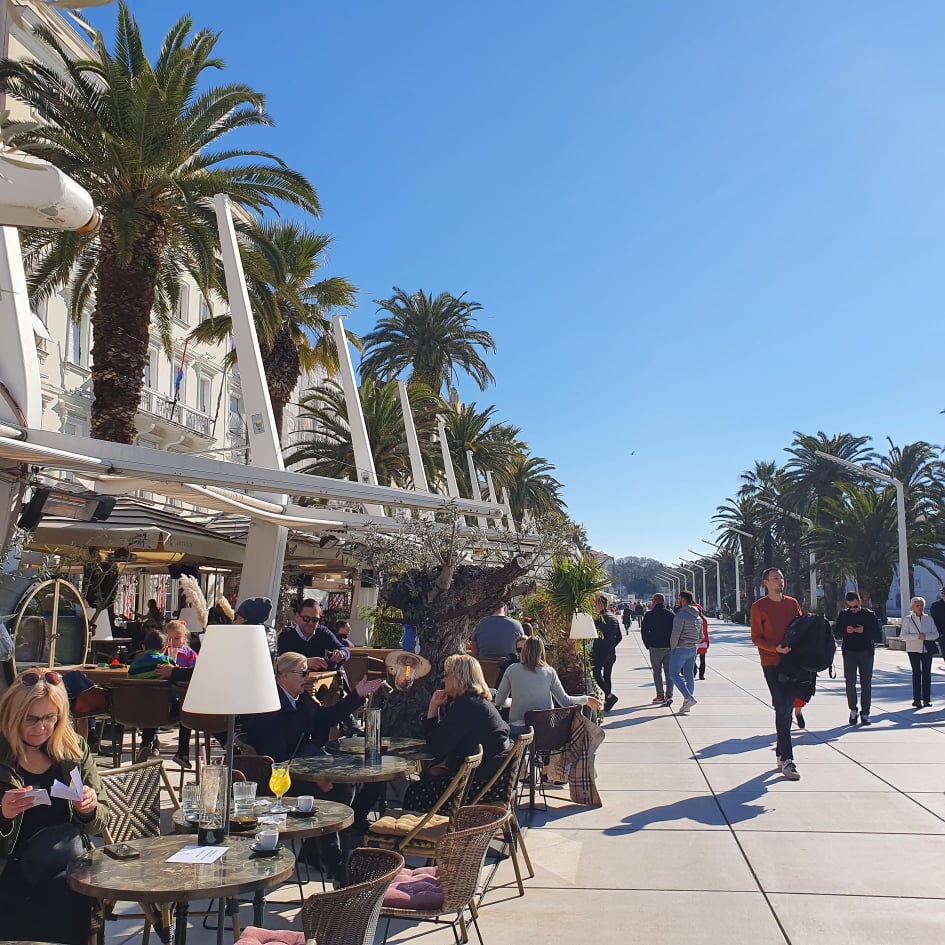
Recall, the National Civil Protection Headquarters announced last week that cafe terraces would reopen, but still under some strict guidelines. Namely, catering facilities can operate from 6 am to 10 pm, but only in open areas of the facility, while respecting the distance between guests of a minimum of three meters between tables and 1.5 meters between chairs. Terraces with plexiglass must be opened to allow airflow.
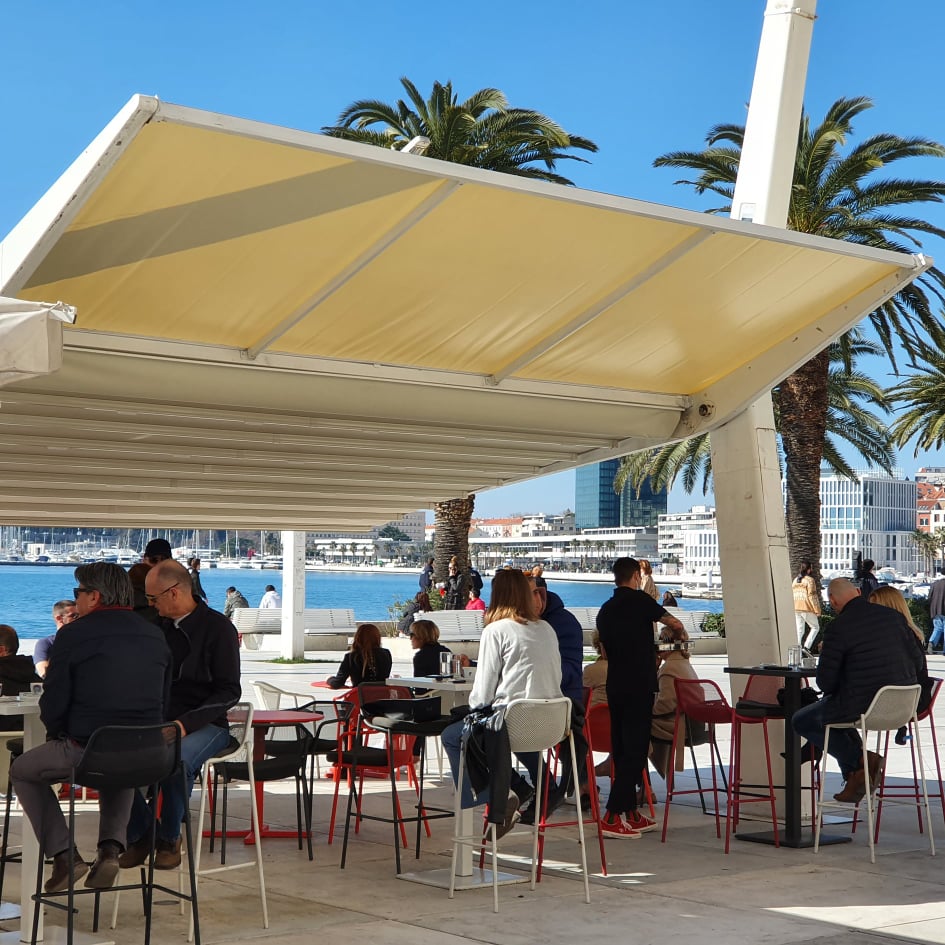
Hand disinfectant should also be available at the entrance, and masks are required when going to the toilet indoors, which must be clearly stated.
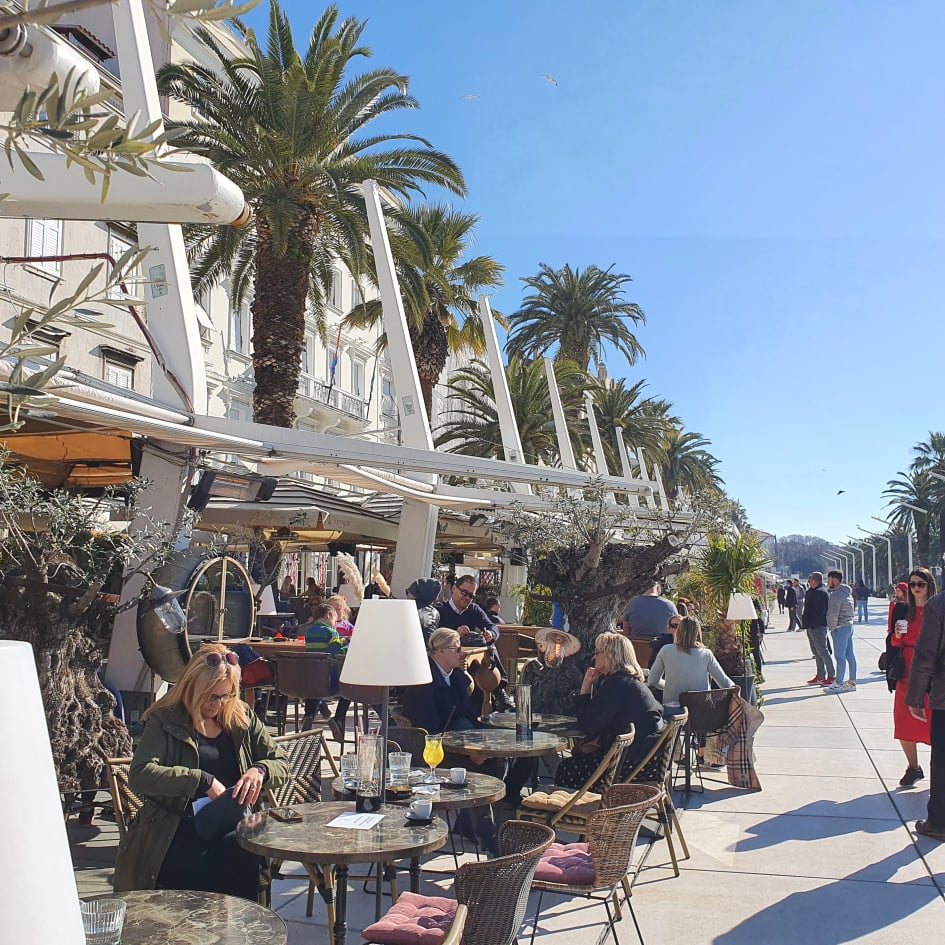
Music was originally banned, but the associations of musicians and caterers reached an agreement with the Headquarters, so music is also allowed, provided it is not too loud.
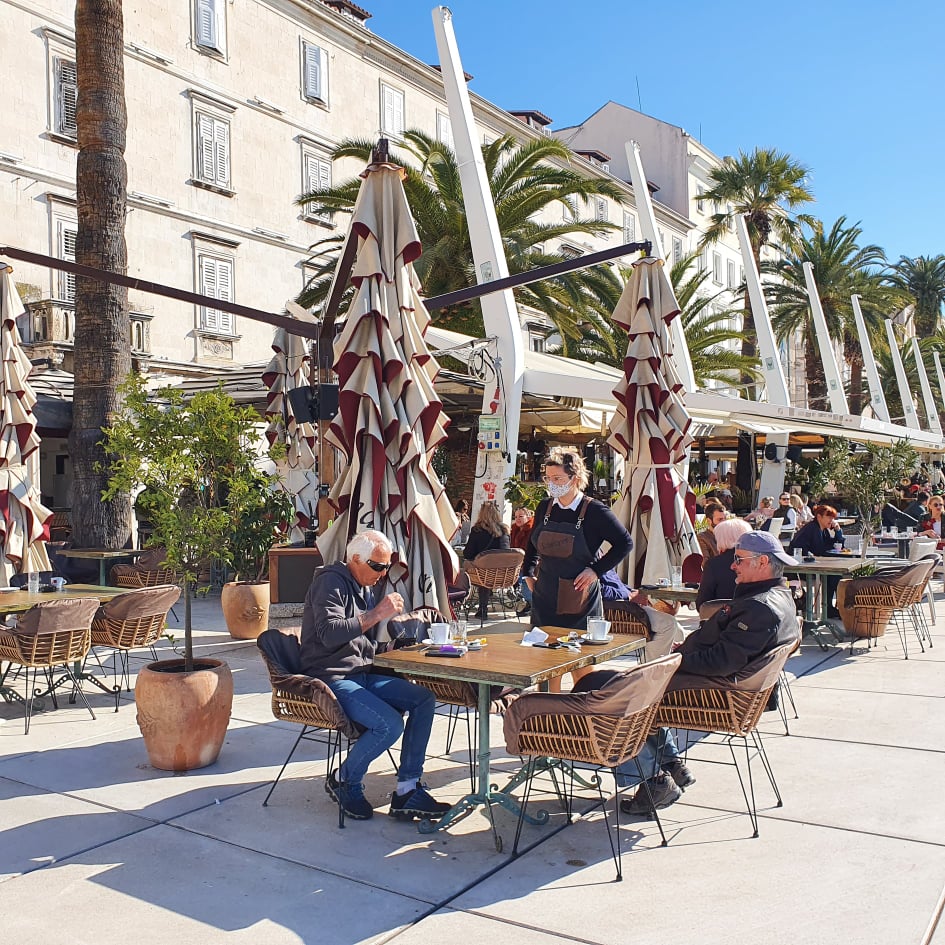
On a sunny morning in Split, with temperatures already reaching 14 degrees Celsius by 10 am, eager citizens flocked to cafe terraces around the city, and especially to the beloved Riva, where they had to fight for benches or enjoy hot drinks propped up against walls until now.
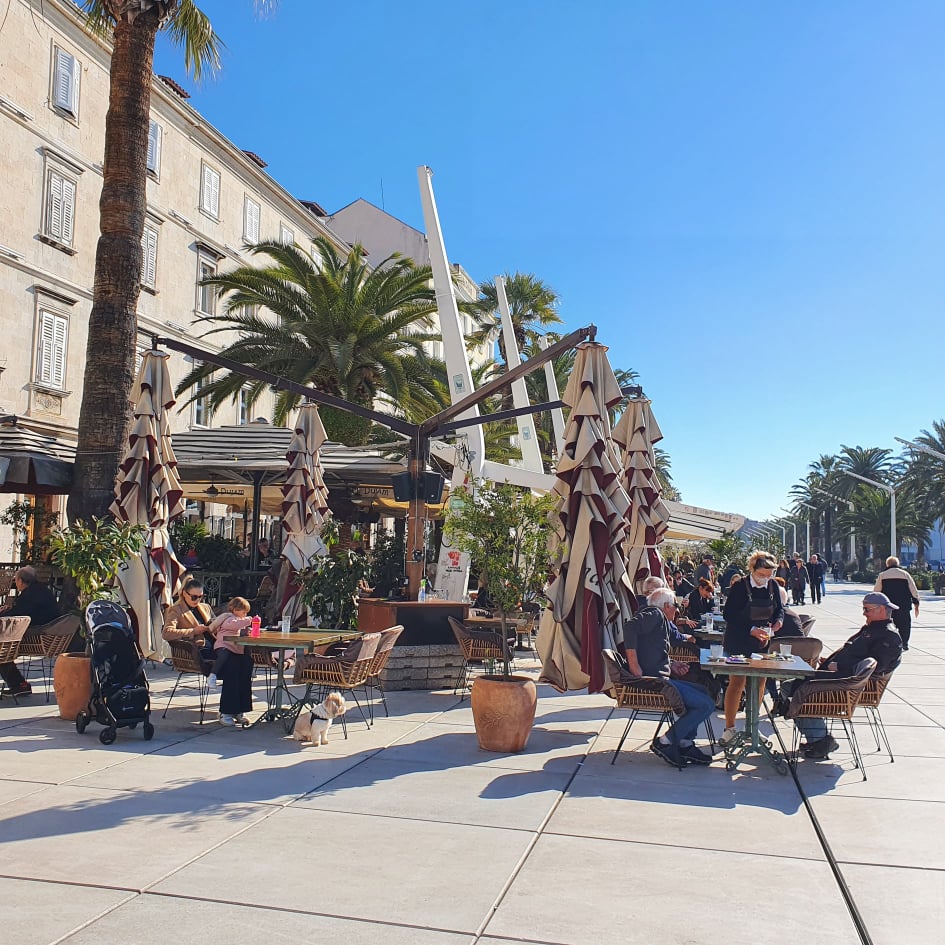
Waiters expect the biggest buzz around noon, though many early birds could hardly wait to reinstate their morning ritual - coffee, newspaper, and good company.
In the past 24 hours, 91 new coronavirus infections and 11 related deaths have been registered in Croatia, the national COVID-19 response team said on Monday.
There are currently 2,892 active cases, including 791 hospitalized patients, 64 of whom are on ventilators.
Since 25 February 2020, when the first case was registered in Croatia, 243,064 cases have been registered, including 5,537 deaths.
A total of 234,635 patients have recovered, including 401 in the past 24 hours.
Currently, 14,074 people are self-isolating.
To date, 1,346,946 people have been tested for the virus, including 2,294 in the past 24 hours.
Photos by Mirela Rus
To read more about lifestyle in Croatia, follow TCN's dedicated page.
Croatia Reports 91 New COVID-19 Cases, 11 Fatalities
ZAGREB, 1 March, 2021 - In the past 24 hours 91 new coronavirus infections and 11 related deaths have been registered in Croatia, the national COVID-19 response team said on Monday.
There are currently 2,892 active cases, including 791 hospitalised patients, 64 of whom are on ventilators.
Since 25 February 2020, when the first case was registered in Croatia, 243,064 cases of infection have been registered, including 5,537 deaths.
A total of 234,635 patients have recovered, including 401 in the past 24 hours.
Currently 14,074 people are self-isolating.
To date 1,346,946 people have been tested for the virus, including 2,294 in the past 24 hours.
For the latest news on coronavirus in Croatia, follow the dedicated TCN section.
Andreja Ambriovic Ristov: If Numbers Rise, We'll Seek Stronger Measures
March the 1st, 2021 - Molecular biologist and member of the Government Scientific Council, Andreja Ambriovic Ristov, has stated that if coronavirus infection numbers begin to rise again with the loosening of the country's epidemiological measures, then unfortunately harsher measures will need to be sought.
As Poslovni Dnevnik writes, molecular biologist and member of the Croatian Government's Scientific Council, Andreja Ambriovic Ristov, told HRT on Monday that we shouldn't be surprised that the South African strain of the novel coronavirus, which is already present in many European countries, has now arrived in Croatia. Luckily, as she says, the infected tourists didn't pass the disease on to anyone else.
Andreja Ambriovic Ristov has said she expects Croatia to receive more doses of the vaccine and she hopes the country will manage to achieve a vaccination rate of at least 50 percent.
''Vaccination of the population depends on the spread of these variants, for variants that spread faster, we'll need more vaccination. Perhaps the data on 70 percent of the population needing to be vaccinated, which would be enough for collective immunity, will have to be revised. The fight against these new variants is to keep the epidemic under control and reduce the number of circulating variants in the population,'' explained Andreja Ambriovic Ristov.
"We need to continue to monitor all these variants, by sequencing or introducing a customised PCR method that will look for these variants, the South African one, and for the British variant we already know that it is present in our population, at a level of about 20 percent. As we know that this variant is spreading faster, we expect that it will compete with the old strain and overtake it,'' she added.
What we currently know is that the British variant of the novel coronavirus spreads more rapidly, but the symptoms are the same as for the previous variants. We know that the South African strain is spreading faster, but we don't know how much. For the South African strain, we don't have sufficient data on whether it causes a more severe form of the disease or not.
“When it comes to populations where there are two fast-spreading variants circulating, it will be interesting to see which one will win. People can in no way detect if it is a variant, the symptoms are the same. This virus causes different symptoms in people of different ages, from people being asymptomatic carriers to people who are younger ending up with severe symptoms,'' said Andreja Ambriovic Ristov.
She stressed that all of the current vaccines against the virus work well because they protect against severe forms of the disease.
She pointed out that it is not at all true that overcoming the disease protects better than vaccines. ''Immunity gained from a vaccine is better than overcoming the disease precisely because the symptoms are different, so it is recommended that people who have caught coronavirus and recovered still go and be vaccinated. It's clear that SARS-CoV-2 is not a seasonal virus and that it is present throughout the year,'' Ristov said.
Asked why there is an increase in the number of patients in the countries where it is now summer, Andreja Ambriovic Ristov explained: ''It all depends on the epidemiological measures, the number of people around and the number of circulating viruses. If one variant is more contagious than another, then even with existing epidemiological measures, the epidemic flares up. There's no need to panic about new variants, they are constantly being created through mutations. We expect new variants and that's why we're constantly monitoring them. The way to fight these new variants is with epidemiological measures that reduce the circulation of the virus.''
Speaking about the situation in Croatia, Andreja Ambriovic Ristov stated that the measures were delayed at the end of the year, which was reflected in the number of new cases of coronavirus. "If we see an increase in the number of infected people, and given which variant is in question, we'll certainly propose the introduction of stricter measures," she said.
Andreja Ambriovic Ristov recommended that citizens be vaccinated with AstraZeneca, adding that she expects that its effectiveness in the elderly will not be much lower than it is in the younger population.
''We're all amazed at what is happening with the low utilisation of the AstraZeneca vaccine. The professional literature states that it has an efficiency of 62 percent. Influenza vaccines are 40 to 60 percent effective and anyone who has been vaccinated has had far fewer symptoms and no one has died. I see absolutely no reason why vaccines with an efficiency of 62 percent are not considered as good as the Moderna or Pfizer vaccines," she told HRT.
Sibenik Cafes Offering Free Coffee to Go as Anti-Epidemic Measures Loosened
March the 1st, 2021 - Croatia has finally loosened up some of its anti-epidemic measures today, allowing for the opening of restaurant and cafe terraces and the serving of drinks and food outdoors, much to the delight of those missing Croatia's famed coffee culture. Sibenik cafes are taking things a step further.
As Poslovni Dnevnik writes, Drazen Orescanin, the executive director of the Voice of Entrepreneurs (Glas Poduzetnika) Association, said in conversation with Dnevnik N1 on Sunday that Croatian cafe owners simply want to be permitted to work and do not want to be a burden to society in any shape or form. He also announced today's ''action'' by Sibenik cafes and their owners.
As previously stated, the previous anti-epidemic measures which banned the work of catering and hospitality facilities are being relaxed in Croatia today. From today, it is possible for Croatian cafes and restaurants to have their staff serve guests outdoors on open terraces in compliance with the measures. Those measures include proper distancing between people and between individual tables.
The new working hours for Croatian cafes and restaurants are from from 06:00 to 22:00, work can only be performed outdoors on open areas (without the need for Plexiglas and glass), it is necessary to provide a distance of 1.5 metres between each chair and at least 3 metres between each table. The maximum number of people on the terrace at any one time should be displayed at the entrance, and the mandatory placement of disinfectants for customers are some of the conditions.
Drazen Orescanin pointed out that some caterers are "on the verge of crying" due to their dire financial situation caused by the pandemic and the measures which banned gatherings in an attempt to stop the spread of the novel coronavirus. Although the National Civil Protection Directorate recently changed their minds on the playing of music, which was initially not allowed, Orescanin said that they'd previously had the idea to play the press conferences of the Directorate on repeat if they didn't reverse the ban on music.
He also announced today's ''action'' from Sibenik cafes: ''On the occasion of the opening up of the terraces, people will be able to drink free coffee outside on the terraces from 12:00 to 13:00. I believe that cafe owners in other cities will also join in with this.''
For the latest travel info, bookmark our main travel info article, which is updated daily.
Read the Croatian Travel Update in your language - now available in 24 languages.
Croatian Civil Protection Directorate Changes Mind on Music in Cafes
February the 28th, 2021 - The Croatian Civil Protection Directorate has changed a decision it had previously made which foresaw a ban on the playing of music in restaurants and cafes after their terraces are permitted to begin work as of Monday.
As Poslovni Dnevnik writes, Minister Davor Bozinovic stated at the most recent regular press conference of the Croatian Civil Protection Directorate that from Monday on, serving food and drink on the open terraces of catering and hospitality facilities will be allowed once again, but that music wouldn't be permitted.
As Vecernji list has since learned, they have now changed that decision. The associations of musicians and caterers have reached a mutual agreement with the Croatian Civil Protection Directorate on the matter and music is as such now going to be allowed, provided it is not played too loudly.
It's worth noting that Minister Davor Bozinovic also announced that from Monday on, the working hours of catering and hospitality facilities will be from 06:00 to 22:00, and only outdoor work will be allowed. If the terraces have plexiglass, everything needs to be opened up for air to flow through unhindered. It is necessary to ensure that a proper distance is kept between guests, chairs must be arranged at 1.5 metres apart, and tables must also be at least three metres apart. Disinfectant should be available at the entrance, it is possible for customers using the outdoor part of the facilities to go inside to go to the toilet, but everyone must wear a mask and that instruction must be clearly stated.
Concessions related to sports activities have also been announced by the Croatian Civil Protection Directorate, and it has been prescribed that the halls in which training takes place must be ventilated, and the largest number of people must not exceed more than one person per 20 square metres of the hall.
Only contactless sports can be practiced. For example, football, basketball, but also martial arts can be practiced, but in such a way so that conditioning training is done, which doesn't typically require contact.
Tennis can be played as there is no contact between the players. The hall and all props and equipment should be thoroughly cleaned and changing rooms and showers should absolutely not be used, but may, under certain measures, be arranged so that no more than two people can enter the locker room at once. Once again, it is mandatory to wear a mask.
For the latest travel info, bookmark our main travel info article, which is updated daily.
Read the Croatian Travel Update in your language - now available in 24 languages.
Spaladium Arena Prepared as Mass Vaccination Site in Split
February 28, 2021 - Preparations are coming to an end at the Spaladium Arena, soon opening as a mass vaccination site in Split.
"Since last Monday, members of the Split-Dalmatia County Red Cross have been working on setting up the Spaladium Arena so that when larger quantities of vaccines arrive, it can be ready to welcome the start of large-scale vaccination. We have arranged 20 cubicles in which people will be vaccinated, which are needed to have a little privacy when getting vaccinated. As far as we are concerned, everything will be prepared by the end of this week at the latest," said Joško Metličić, the new director of the Split-Dalmatia County Red Cross, for Slobodna Dalmacija.
Only those who have been scheduled for vaccination will be able to come to the Spaladium Arena.
"At a specific hour, a certain number of people will be scheduled, who will be called and released to the Arena, where they will sit in prepared places and wait their turn for vaccination. Those who, say, are scheduled at 11 am will not be vaccinated at 9 if they come to the vaccination site two hours earlier. So, the order will have to be respected according to the list and according to the schedule," says Metličić.
Željka Karin, director of the Institute of Public Health of the Split-Dalmatia County, said we could start with large-scale vaccination as early as next week.
"We still don't know how much and which vaccine we will get next week. We received about six thousand doses of PfizerBiontech and AstraZeneca vaccines this week, and Moderna did not come, although it was announced. We distributed all the obtained vaccines to family doctors and special duty points, where people are also vaccinated. How many people have been vaccinated with those six thousand doses so far? We don't know yet. However, I think that next week we should not receive less than six thousand doses," says Dr. Karin.
Interest in vaccination is high.
"People are calling; they want to get vaccinated. If we had sufficient quantities of vaccines, we in Split-Dalmatia County would quickly vaccinate the population. We would have a satisfactory number of vaccinated by June this year at the latest. But for now, unfortunately, the vaccine is not in sufficient quantities. Next week we could put Spaladium Arena into operation to see if everything will work well and so that we can, if there are any shortcomings, fix those shortcomings so that it is ready for the real mass vaccination, which I expect in mid-March," explains Dr. Karin.
The number of cases in Split-Dalmatia County started to grow, connected with several events where groups of people were noticed (family celebrations, socializing in apartments).
"In the last two days, we have a slight decline, and I want to believe that there will continue to be a decline in the number of new infections. But when the terraces of catering facilities open, if the numbers start to go wild again, they will need to think about a possible closure again because it won’t make sense. I believe that it is in everyone's interest to have a tourist season, and I believe that it is in the interest of all private individuals who have restaurants and cafes to work over the summer. Therefore, I ask everyone and call on everyone to take responsibility and to respect all epidemiological measures, so that they would not be surprised and so that sometime in April they would not be forced to close catering facilities again," concluded Željka Karin.
To read more about COVID-19 in Croatia, follow TCN's dedicated page.
Croatia Registers 520 New Coronavirus Cases, Eight Deaths
ZAGREB, 27 February, 2021 - In the past 24 hours 520 new coronavirus cases and eight COVID-19 deaths have been registered in Croatia, the national COVID-19 response team said on Saturday.
There are 3,126 active cases, including 760 hospitalised patients, 75 of whom are on ventilators, while 14,442 people are self-isolating.
To date 1,338,842 people have been tested for the virus, including 6,002 in the past 24 hours.
Since 25 February 2020, when the first case was registered in Croatia, 242,617 cases of infection have been registered, including 5,511 deaths and 233,890 recoveries, 342 of which in the past 24 hours.
How are Croatian Hotels Preparing for Upcoming Tourist Season?
February the 27th, 2021 - What awaits Croatian hotels and how are they preparing for the upcoming tourist season this summer as investments were forced to a halt by the coronavirus crisis in 2020?
As Marija Crnjak/Poslovni Dnevnik writes, although the fourth quarter has been a period of cost generation for tourism companies across Croatia in normal, pre-pandemic years, in addition to revenue, in 2020, as expected, all records were broken, in the sense of them all being in the red.
However, thanks to state measures, moratoriums placed on loans and the like, Croatia's leading large tourism companies have managed to maintain the stability they need to realise the season ahead. Annual results for 2020 show that, although everyone has shelved most large investments and postponed them for better times, some investments have been completed or will be on the eve of the 2021 summer season. Croatian camps had the highest turnover last year, which affected the average price and profitability, and the best turnover was achieved by the premium segment, with Rovinj standing out in that regard.
When it comes to Croatian hotels and those which dominate, throughout 2020, the Valamar Riviera Group generated total revenues in the amount of 697 million kuna, a mere 31 percent of the total revenues the company generated in the record year of 2019. Despite unfavourable business circumstances, the group generated 2.3 million overnight stays and positively adjusted the EBITDA in the amount of 126 million kuna in 2020, but ended the pandemic-dominated year with a total loss of 359 million kuna, unlike the year before in which they had profit of 306 million kuna. Valamar's net debt increased by 29.9 percent in 2020, from 2.19 billion kuna to 2.85 billion kuna.
For 2021, the Supervisory Board of Valamar Riviera approved investments in the amount of 132 million kuna intended for the finalisation of previously planned/started investments (more precisely in the Istra Premium Camping Resort and accommodation for employees down in Dubrovnik), the completion of the first phase of investments in Valamar Pinea Collection Resort and the digitisation projects, investments in the maintenance and preparation of future projects. Reduced investments planned for 2021 are focused on the completion of started projects and the preparation of projects for new growth and development when the conditions are right.
The Supervisory Board of Imperial Riviera, which includes Croatian hotels in Makarska, Rab and Porec, approved investments in the amount of 41 million kuna and are primarily focused on the completion of investments in their hotels in Makarska and in Porec. This company had 90 million kuna in sales revenue last year, which is almost 65 percent less, operating profit amounted to 23.2 million kuna, which is a decrease of almost 75 percent, but excluding the effect of state aid received in order to preserve jobs, as well as various concessions, the EBITDA remained positive. The group's net loss amounts to -39.7 million kuna.
Maistra, including Dubrovnik's Hilton Imperial, recorded 45 percent of sales throughout 2020, with 41 percent of sales of goods and services. Segment analysis shows that in 2020, camps performed 9 percent better in terms of the number of units sold than the Maistra average stood at. In the period from June to September, when business able to be done without significant restrictions due to the country's epidemiological measures, the best sales compared to last year were achieved by the luxury hotel segment in Rovinj.
The management of the Arena Hospitality Group, known for its Croatian hotels and hotels abroad, has especially pointed out in their report on the matter that they are financially ready for another challenging year.
''Our financial position is still strong, amounting to 425.6 million kuna as of the 31st of December 2020. The various analyses we have conducted can ensure that the group has sufficient funds to be able to withstand uncertain operations throughout 2021, while market conditions are not stabilising,'' they stated from the company, whose pandemic revenue was slashed by 69.4 percent last year to 238.3 million kuna with an EBITDA loss of 18.3 million kuna, compared to a profit of 229.5 million kuna in pre-pandemic, record 2019.
For the latest travel info, bookmark our main travel info article, which is updated daily.
Read the Croatian Travel Update in your language - now available in 24 languages.
Croatian Prime Minister Talks Job Preservation Measure Extension
February the 27th, 2021 - Croatian Prime Minister Andrej Plenkovic has worked to clear up doubts surrounding the continued job preservation/economic aid which has been being paid out to Croatian companies and which is due to expire on Monday.
As Poslovni Dnevnik writes, the Croatian Prime Minister reported that the European Council had discussed the need to speed up the delivery of coronavirus vaccines. He recalled the fact that Croatia had ordered 6.8 million doses of vaccine, more than is needed for all of its adult residents.
"It's currently estimated that about 8 percent of adult citizens have been vaccinated at the European Union level so far, and the goal is to reach 70 percent by the summer months. The EC will continue talks with leaders within the pharmaceutical industry. Croatia will therefore be in a position to vaccinate a larger amount of its population. We expect 730,000 doses of vaccine to arrive by the end of March,'' Plenkovic said.
The Croatian Prime Minister also commented on the announced easing of epidemiological measures and on the talks on the continuation of aid for enterprises.
"We've made a political decision to continue to monitor the economy, regardless of the possible scope of that work," said Plenkovic, announcing the continuation of support for the economic activities that cannot work as they did before the coronavirus pandemic struck would continue to receive their financial support from the state. He stated that they consider it the right decision and that the necessary funds will be found in the positions of the ministries, and that no rebalance will be needed.
"I'd also like to address the issue of bookmakers and casinos. All of them pay concessions, in case they don't work, there is no such income and the state still pays them. When we analysed this we saw that their business isn't epidemiologically problematic, such is the attitude of our epidemiologists. The meaning behind that decision is so that the state can benefit. None of us are personally prone to gambling,'' he said.
He also commented on the record decline in Croatia's GDP.
"Croatia, like other tourist countries, found itself in a situation where the coronavirus crisis hit it extremely hard. This 8.4 percent drop is better than the other estimates which were given for Croatia. Thanks to government measures, today, when the sums are underlined, we see that there are only 2.1 percent fewer employees in 2020 than there were back in 2019, while salaries have increased by 2.7 percent. That's very important,'' the Croatian Prime Minister pointed out, once again stating that Croatian employers have been paid 9.3 billion kuna so far to overcome the crisis.
For the latest travel info, bookmark our main travel info article, which is updated daily.
Read the Croatian Travel Update in your language - now available in 24 languages.
South African COVID-19 Variant in Croatia, First Two Cases Confirmed
February 27, 2021 - The first two cases of the South African COVID-19 variant in Croatia have been confirmed.
Index.hr reports that the first two cases of the South African COVID-19 variant in Croatia have been confirmed, and there has also been an increase in the number of people infected with the UK variant of the virus.
Epidemiologist of the Croatian Institute of Public Health, Goranka Petrović, confirmed the news for N1.
"Yesterday, we received the results of sequencing those samples that we sent to the European Center for Disease Control. Of the 300 samples whose results arrived, 60 were positive for the UK variant, or 20% of the positive samples. That’s a pretty big percentage. The South African variant was also confirmed in two people who returned from Africa, from Zanzibar," explained Petrović.
"According to the existing data, I would say that the UK variant is spreading faster, they say up to 50%. In this variant, it has not been confirmed that it avoids the immune response to that extent, which is the case in the South African variant. Namely, in the South African variant, it has been noticed that some mutations increase the probability of avoiding the immune response, whether the effectiveness is partially or significantly reduced to vaccination or that people who once had Covid can now be susceptible to reinfection," said Petrović.
She added that vaccine manufacturers are also closely monitoring the emergence of new COVID-19 variants.
“The results of the research showed that both Pfizer and Moderna vaccines, and especially AstraZeneca, have poorer efficacy on the South African variant, and they are considering in which direction to modify their vaccines. It is to be assumed that this should be a relatively easy way to adapt, but it also requires a change in production," said Petrović.
The epidemiologist stated that it is still unknown whether people will need to be re-vaccinated against COVID-19. She pointed out that the goal now is to vaccinate as many people as possible, especially because of the new variants.
“When we talk about new variants, there are many because it mutates, especially now that it is in a much less hospitable environment. A year ago, the population was very susceptible because it was not in contact with the virus. However, a year has passed, and people have managed to create some protection, and of course, it is also trying to adapt to that because it wants to survive. That is the reason why as many people as possible should be vaccinated as soon as possible," explained Petrović.
She added that the new variants are a cause for concern because they have some characteristics that may change the pandemic's course.
"They spread easier and faster, so they can increase the number of hospitalizations and deaths, burden the health care system. There are also some indications that the UK strain could cause a somewhat more severe clinical picture, but that has not been confirmed yet," Petrović explained.
Commenting on the slight increase in the number of newly infected, Petrović stated that people had relaxed a bit and rooms are not ventilated. In some cases, people conceal close contacts. Petrović also said it was still difficult to say whether the increase was actually an indication of a third wave.
"It takes another 14 days to see if this is something we have under control or if it requires some additional measures. It is too early to say whether this is the third wave, but given the knowledge that we have 20% positive for the UK variant, we should be cautious," said Petrović.
As Index unofficially found out, Croatia has 520 new cases today, and about 6000 people have been tested.
To read more about COVID-19 in Croatia, follow TCN's dedicated page.


